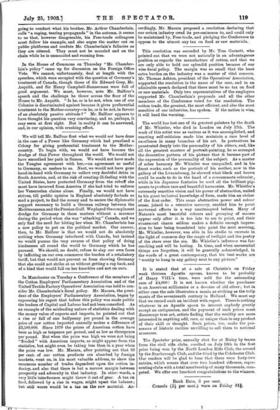In Manchester on Tuesday a Conference of the members of
the Cotton Employers' Parliamentary Association and of the United Textile Factory Operatives' Association was held to con- sider Mr. Chamberlain's fiscal policy. Mr. Macara, the presi- dent of the Employers' Parliamentary Association, began by expressing his regret that before this policy was made public the leaders of Capital and Labour had not been consulted. As an example of the misleading nature of statistics dealing with the money value of exports and imports, he pointed out that a rise or fall of one halfpenny per pound in the average price of raw cotton imported annually makes a difference of £3,500,000. Since 1870 the prices of American cotton have been as high as tenpence per pound, and as low as threepence per pound. But when the price was high we were not being " flooded " with American imports, as might appear from the statistics, but might even be taking less than in a year when the price was low. Mr. Macara, after pointing out that 80 per cent. of our cotton products are absorbed by foreign markets, went on, in his most valuable address, to show the enormous number of trades dependent upon the cotton in- dustry, and also that there is but a narrow margin between prosperity and adversity in that industry. In other• words, a very little interference might throw it out of gear. A tax on food, followed by a rise in wages, might upset the balance ; but still worse would be a tax on the raw material. Ac-
cordingly, Mr. Macara proposed a resolution declaring that our cotton industry owed its pre-eminence to, and could only be maintained by, Free-trade, and pledging the Conference to oppose to the utmost any tax on food or raw materials.






































 Previous page
Previous page